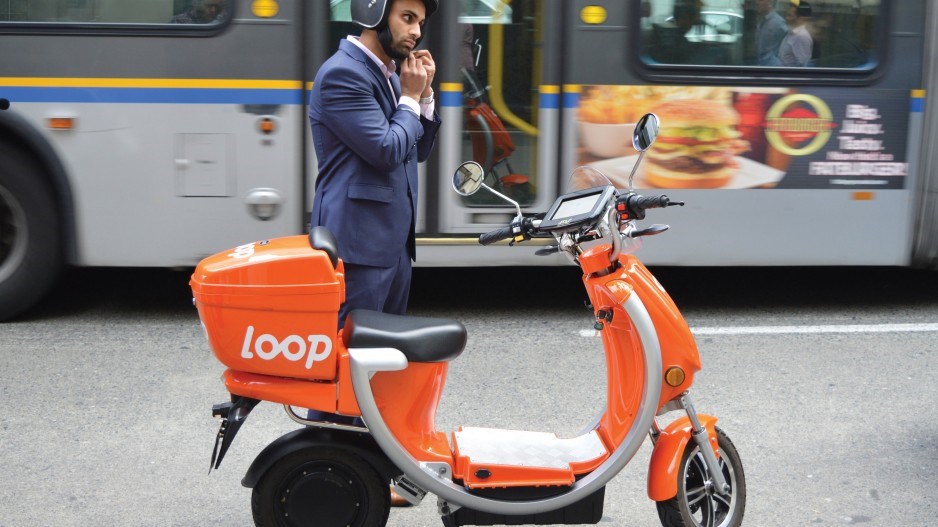According to a report by Navigant research, worldwide membership in car-sharing programs will grow from 2.3 million in 2013 to more than 12 million by 2020, with an accompanying rise in revenue from $1 billion to $6.3 billion.
Vancouver-based company Loopshare (TMX: LUP) is looking to capitalize on that fast-growing share-transportation market with their alternative to four-wheeled travel: electric scooters.
“The idea is to position ourselves between public transit and [the] Ubers of the world,” said Loopshare CEO Anwar Sukkarie. “It should be a very affordable and easy service to provide.”
Loopshare scooters are keyless and are accessed by a web app. Users book through the app and then receive a pin number to unlock their desired scooter. Enrolment in the Loopshare service will cost $29 per month for an unspecified amount of travel time, then 40 cents per kilometer once travel time is exceeded.
The service has yet to launch in Vancouver.
Sukkarie, who founded the company in 2009, has over 25 years of experience in the telematics (the long-distance transmission of computerized information), telecom and wireless industries. That background helped him develop the company’s patented software, which is incorporated into a digital dashboard, somewhat resembling a rugged iPad, that fits onto any two-wheeled vehicle.
Loopshare and the City of Vancouver have inked a deal for employees to test-run a three-to-six-month pilot program downtown. Depending on the success of that project, the city has determined three viable locations for Loopshare parking stations and will introduce Sukkarie and his team to the big name companies in Vancouver like BC Hydro and Telus.
But while car and bike sharing play prominent parts in the city’s recently released transportation 2040 plan, scooters and the like are noticeably absent.
“[Commuters] in downtown Vancouver are expected to walk, ride a bike, or take the bus,” said motorcycle lobbyist Ian Tootill. “Scooters, three-wheelers and electric bikes are not even considered in the [transportation] plan.”
Sukkarie said the city has agreed that spaces will be available at the end of street corners, as they are currently designated for motorcycles, and that the company has been in close contact with the City of Vancouver. According to the City of Vancouver website, electric scooters, both registered and unregistered, can park for free.
Currently there is only one other scooter-sharing service in North America – San Francisco’s Scoot Networks.
But while scooter-sharing services are rare, the explosion of bike-share popularity will be hard to match. Mobi has achieved success in Vancouver with over $315,000 in annual memberships since opening last July, a figure that far exceeded the company’s expectations.
Meanwhile, another company entering the sustainable transportation field is VeloMetro, which offers the Veemo, an enclosed, three-wheeled pedal car marketed as a creative alternative for urban transportation. No driver’s licence is required and the Veemo has full access to bike lanes, avoiding the congestion of downtown streets. Electric scooters are not permitted to utilize bike lanes and a driver’s licence is required to operate one.
Meg Holden, urban studies professor at Simon Fraser University, said that while Loopshare might work in Vancouver, the development of the bike lanes is a far more motivating factor for people to consider swapping four wheels for two.
“With the expansion of separated bike lanes now forming an actual functional network through downtown, there is an explosion of different kinds of personal mobility devices being used,” Holden said. “We have created the infrastructure and people are finding fun ways to make use of it.”




